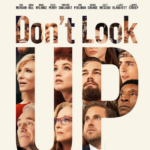Dune: Part One (2021)
Today’s guest review is by Justin Petrisek.
It’s all about making money in the desert—or at least that’s what 2022 seemed to be about. In March of 2022, Dune – a movie set primarily on the desert planet of Arrakis – walked away with the most Oscars (six) at the Academy Awards, plus $402 million at the box office at a time when fewer and fewer people were going to movie theaters. Then, just eight months later, audiences were back in the desert to watch a World Cup in Qatar of all places.
It might seem odd trying to connect the world’s largest soccer event with a science fiction movie based on the seminal Frank Herbert novel, but the two have something in common: money and economic power at the expense of innocent life.
We’ll return to the FIFA World Cup shortly.
What’s always fascinated me about Dune isn’t the messianic storyline or the sand worms. Yes, there are sand worms, and in Denis Villeneuve’s version of the story they look quite spectacular – much better than what you’re probably imagining if you’re a fan of the 1990 film Tremors with Kevin Bacon. No, what I’ve always found most fascinating about Dune is the economy and its ripple effects across the universe.
The world – or Imperium as it’s called in the books and movie – revolves around a single product called “spice” or mélange. Spice is a valuable resource that not only gives the user a longer life span and greater vitality, but it’s also essential to faster-than-light space travel. However, there’s a catch. Spice can only be found on the harsh desert planet of Arrakis. This makes spice the most indispensable and valuable commodity in the universe bar none and, as a result, makes Arrakis the center of tremendous conflict.
House Atreides, led by Duke Leto Atreides (Oscar Isaac) and his son and heir Paul (Timothée Chalamet), has been ordered by the emperor to take over the rule of Arrakis from House Harkonnen. The Harkonnens, who have built a vast empire and accrued more money than the emperor himself, vow to take back the planet and their coveted spice fields.
Not only have innocent people, including the native Fremen, suffered tremendously under Harkonnen rule, but the Harkonnens plan on wiping out the entire Atreides people, including Paul and his parents. The Harkonnens show a tremendous disregard for human life; they devalue it at every turn.
In the opening scenes of the film, Leto questions how much it would have cost the royal entourage to attend the ceremony by which House Atreides formally takes over care of Arrakis from the Harkonnens. “A total of 1.462 million solaris, round trip,” he’s told. We’re clearly in a world that deals with astronomical numbers as if it were nothing. But for Leto, it isn’t nothing. He seems to know not only the cost of everything but more importantly the value. And what does he value most? Protecting his family and especially his son, Paul.
When Paul questions whether he can answer the call to be the future leader of House Atreides, Leto reassures him. “If your answer is no … you’ll still be the only thing I ever needed you to be – my son,” he says.
But note everyone values human life, family, or peace the way Leto does.
Several key players, including the slug-like Baron Harkonnen (Stellan Skarsgård), are plotting the overthrow of House Atreides. The Baron declares that all the people of House Atreides “will die in the dark” and that no one will know that they were ever involved in this genocide. Even when the Baron promises to let Paul and his mother, Lady Jessica (Rebecca Ferguson), live, his regard for human life is quickly unmasked. “I give you my word. We will not harm them,” the Baron says. Moments later, out of earshot, the Baron reveals his true intention. “No Atreides will live,” he says. “I said I would not harm them, and I shall not. But Arrakis is Arrakis, and the desert takes the weak. My desert. My Arrakis. My Dune.”
And here lies the crux of the problem, both in Dune and for us. Words can so often mean nothing. Our money, our greed, our actions reveal what we actually value – and as is too often the case, what people can value over human life itself.
The political and predatory machinations of the Harkonnens does not feel very dissimilar from recent events in the news. Skyrocketing gas prices, formula shortages, the war in Ukraine – while there are certainly political, production, and supply chain factors that contributed to these events, there is also a deep sense that many companies and countries prioritize profit over people, cost over compassion, financial return over freedom or religion.
In more ways than one, human life is made to seem lesser, a footnote within society rather than the most indispensable part of society.
The continued devaluing of human life became readily apparent leading up to and during the most recent edition of the FIFA World Cup. The international football organization has long been accused and found guilty of bribery, money laundering, and wire fraud, leading to Russia and Qatar being awarded hosting rights for the 2018 and 2022 World Cups, respectively. As a result of the public criticism of FIFA, a greater spotlight shone on the recent edition of the tournament.
Qatar, a nation that relies on a mostly migrant work force, has been under fire for its treatment of migrant workers, forced labor, working conditions, and unexplained deaths of those working there. And while the exact number of workers who died constructing the World Cup stadiums (which reportedly cost between $6.5 – 10 billion) has been tough to nail down, there is a clear disregard for human life.
Perhaps Herbert’s novel is more prescient than we give it credit for, and perhaps Villeneuve’s film (with a second installment coming in early 2024) is more timely than ever. The treatment of those under Harkonnen rule in Dune is brutal and cruel. And it’s scary to think that the dark future of Herbert’s novel is beginning to echo in our own world today.
World events should not result in a devaluing of life. Shortages should not stop us from doing what is right by our neighbor or for the stranger who desperately needs help to eat, to work, to live. Politics and money should not be chosen over freedom, faith, or human life, and yet … we just held a tournament in a far-flung part of the world because the money made it possible.
Dune is a work that is not only beautiful in its depiction of a harsh desert world, but is also a story that should resonate with us as we continue to find ways to protect the lives of those around us. We may not be trading in spice, but money – when coveted and craved – can lead to the same cruel and dark fate, the same devaluing of life, and the same future.
Dune is directed by Denis Villeneuve. The story is adapted from Frank Herbert’s epic science fiction novel. The film has an MPAA rating of PG-13 for sequences of strong violence, some disturbing images and suggestive material. Dune: Part Two is set to be released in the U.S. on March 15, 2024.
Justin Petrisek is a writer from Virginia. He received his M.F.A. in creative writing and M.A. in literature from George Mason University as well as an M.A. in theology from the Augustine Institute.













